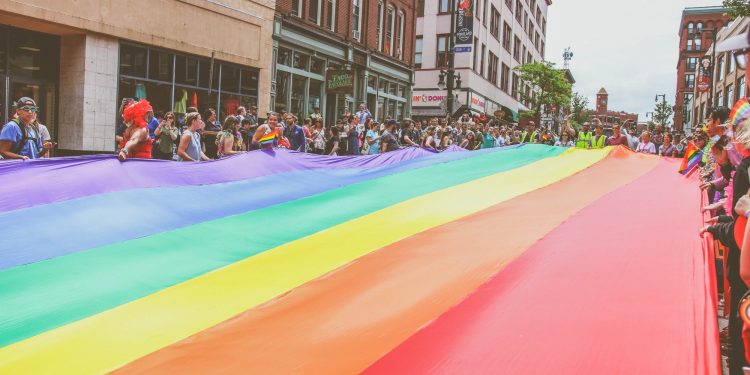Fill Me In
The Indonesian military’s campaign to purge LGBT soldiers from its ranks has moved to include the police force, dismaying several human rights groups on the escalating crackdown.
As reported on Vice, leading the charge is Maj. Gen. Burhan Dahlan, head of the Military Chamber at the Supreme Court. Burhan has commanded military judges to order dismissals of military personnel in the past, and often railed against the community’s “deviant” behaviour, expressing concerns of the personnel’s ability to carry out their duties if they have committed “sexual perversion”.
Why though?
The move comes after the high-profile removal of a chief private, known as P, on 14 October 2020. The Semarang Military Court in Central Java sentenced P to one-year of imprisonment and dishonourable discharge for having a same-sex relationship with another soldier.
P was found guilty of violating Article 103 of the Military Criminal Code on disobedience to service orders; in the verdict, the panel of judges referenced a telegram issued by the TNI chief in October 2019, prohibiting all military personnel from being involved in LGBT relationships.
According to a recent report by Detik News, National Police Brigadier General Awi Setiyono has also said that every member of the National Police is expected to follow the “norm of decency”. Says Awi, “If there are members involved in LGBT groups, the police will not hesitate to take firm action”.
Is homosexuality illegal under Indonesian law?
Under the national Criminal Code, otherwise known as KUHP, private homosexual relations between consenting adults is legal. However, authorities in the Muslim-majority country have enacted crackdowns and criminal sanctions for homosexuality periodically, especially in provinces where bylaws against LGBT communities have been passed.
In everyday life, the LGBT minority continue to face discrimination and hate crimes. In August 2020 alone, police raided a private gathering of 56 men in Jakarta and charged nine men with “facilitating obscene acts” under the nation’s pornography law – an act human rights groups have condemned as a pretext for “inciting hostility toward LGBT people”.
What about LGBT rights in neighbouring SEA countries?
In Southeast Asia (SEA), the stance on LGBT varies. As it stands, same-sex relations are legal in seven out of the eleven countries, although no country has yet legalised same-sex marriage or civil unions. Even in the countries where homosexuality is not criminalised, discrimination persists for members of the LGBT community.
We dive deeper into the various stances on LGBT rights, from most tolerant to the least.
Thailand
Thailand is often regarded as the most liberal and accepting of the LGBT community. Talk of its historic Civil Partnership Bill, which would have legalised same-sex marriage for the first time, took centre stage earlier this year after approval from the cabinet, although it still sits in a vacuum according to Nikkei Asia.
At the moment, LGBT people are allowed to openly serve in the military, and it is the only country to have introduced a Gender Equality Act, which offers protection against discrimination by gender or sexual orientation. It is not applicable, however, in contexts of national security, the exercise of religious principles, and affirmative actions.
Cambodia, East Timor, Laos, Philippines, and Vietnam
All five countries also do not criminalise same-sex relations, but the extent of tolerance for homosexuality differs. Of all the nations, only the Philippines has implemented anti-discrimination laws that protect LGBT people against persecution, and solely in certain provinces.
The LGBT community is allowed to serve openly in the military in Philippines, and Vietnam.
Singapore
Homosexuality continues to be illegal in our home country – an inheritance of the anti-gay colonial law instated in 1938 when Singapore was under British rule. An exhaustive penal code review in 2007 decriminalised female-to-female sexual relations, but Section 377A still remains in force for Singaporean men.
The 377A clause currently bans “any act of gross indecency” between consenting males, with offences being punishable by up to two years in prison.
Malaysia and Myanmar
While the former is an Islamic-majority state and the latter is predominantly Buddhist, both take the same stance towards same-sex relations – that it is strictly prohibited. In Malaysia, the nation’s Sodomy Law (Section 377) criminalises homosexuality with up to 20 years in jail, fines, or canings.
According to Human Dignity Trust, a human rights group, Myanmar’s Penal Code (also Section 377) criminalises homosexuality and the Police Act 1945 (Section 35c) persecutes the transgender community. Like Singapore, the anti-gay laws were appointed during British colonial rule, but never successfully repealed.
Brunei
The harshest laws against LGBT come from Brunei, for which homosexuality is illegal. Under its national Sharia Law, homosexuality is punishable by death, whipping/caning, fines, and imprisonment.
New interpretations of the penal code last year, enforcing the “medieval punishment” of stoning to death, sparked international outrage from human rights groups and celebrities alike when it was announced, according to the BBC. In a follow-up news report, Sultan Hassanal Bolkiah extended a moratorium (temporary prohibition) on the death penalty after the global backlash, but defended the new rules, saying “their merit would soon be clear”.














